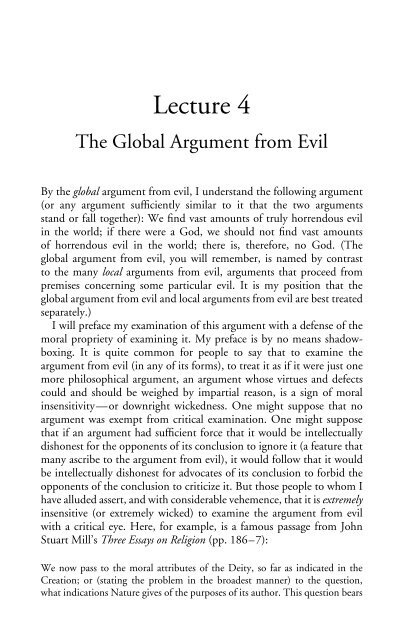The Problem of Evil - Common Sense Atheism
The Problem of Evil - Common Sense Atheism
The Problem of Evil - Common Sense Atheism
You also want an ePaper? Increase the reach of your titles
YUMPU automatically turns print PDFs into web optimized ePapers that Google loves.
Lecture 4<br />
<strong>The</strong> Global Argument from <strong>Evil</strong><br />
By the global argument from evil, I understand the following argument<br />
(or any argument sufficiently similar to it that the two arguments<br />
stand or fall together): We find vast amounts <strong>of</strong> truly horrendous evil<br />
in the world; if there were a God, we should not find vast amounts<br />
<strong>of</strong> horrendous evil in the world; there is, therefore, no God. (<strong>The</strong><br />
global argument from evil, you will remember, is named by contrast<br />
to the many local arguments from evil, arguments that proceed from<br />
premises concerning some particular evil. It is my position that the<br />
global argument from evil and local arguments from evil are best treated<br />
separately.)<br />
I will preface my examination <strong>of</strong> this argument with a defense <strong>of</strong> the<br />
moral propriety <strong>of</strong> examining it. My preface is by no means shadowboxing.<br />
It is quite common for people to say that to examine the<br />
argument from evil (in any <strong>of</strong> its forms), to treat it as if it were just one<br />
more philosophical argument, an argument whose virtues and defects<br />
could and should be weighed by impartial reason, is a sign <strong>of</strong> moral<br />
insensitivity—or downright wickedness. One might suppose that no<br />
argument was exempt from critical examination. One might suppose<br />
that if an argument had sufficient force that it would be intellectually<br />
dishonest for the opponents <strong>of</strong> its conclusion to ignore it (a feature that<br />
many ascribe to the argument from evil), it would follow that it would<br />
be intellectually dishonest for advocates <strong>of</strong> its conclusion to forbid the<br />
opponents <strong>of</strong> the conclusion to criticize it. But those people to whom I<br />
have alluded assert, and with considerable vehemence, that it is extremely<br />
insensitive (or extremely wicked) to examine the argument from evil<br />
with a critical eye. Here, for example, is a famous passage from John<br />
Stuart Mill’s Three Essays on Religion (pp. 186–7):<br />
We now pass to the moral attributes <strong>of</strong> the Deity, so far as indicated in the<br />
Creation; or (stating the problem in the broadest manner) to the question,<br />
what indications Nature gives <strong>of</strong> the purposes <strong>of</strong> its author. This question bears
















